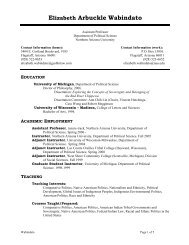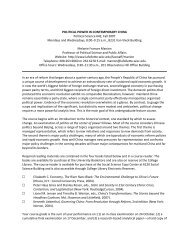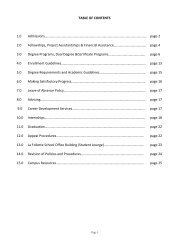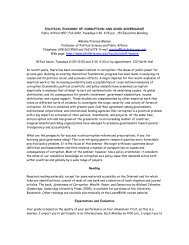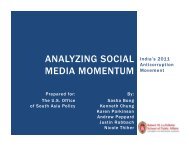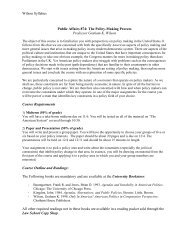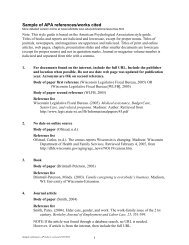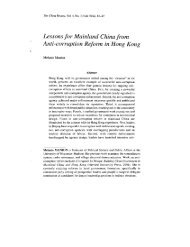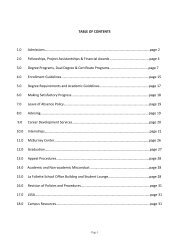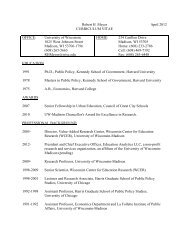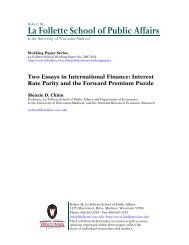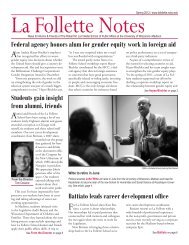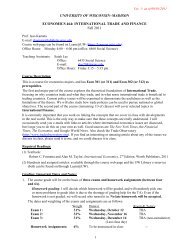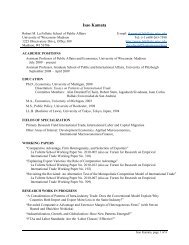SAVE Commission's findings - La Follette School of Public Affairs ...
SAVE Commission's findings - La Follette School of Public Affairs ...
SAVE Commission's findings - La Follette School of Public Affairs ...
You also want an ePaper? Increase the reach of your titles
YUMPU automatically turns print PDFs into web optimized ePapers that Google loves.
that we no longer dictate the process, but plan the vision<br />
that government is there for their customer’s success and<br />
should be driven by principles rather than process. As<br />
one state employee shared, “Our only product is process.”<br />
There are billions to be saved when we remove<br />
the process barriers and let people serve the mission by<br />
being held accountable to results and not process. The report<br />
driven by the Oconomowoc convention where specialists<br />
in business and government suggested a system<br />
for different management, budgeting, procurement and<br />
human resource systems will revolutionize this state if<br />
implemented.<br />
As a specialist and consultant in organizational<br />
change, I anticipate the next stages <strong>of</strong> implementation.<br />
In the denial stage, many will find detail flaws in the<br />
report that they disagree with and therefore discount that<br />
this will happen. It will happen because it is driven by the<br />
people. Chaos will follow, but will lead to a system that<br />
works much better and nobody will want to go back to<br />
the old way.<br />
It’s time to give the government back to the people<br />
<strong>of</strong> the state <strong>of</strong> Wisconsin—A government that is driven<br />
by results, easy for customers to use and does the right<br />
things well.<br />
Reports don’t change things, people do. We need<br />
your help.<br />
Margaret Farrow:<br />
Withholds support for Actions numbered: 4.3 and 17.4.<br />
The <strong>SAVE</strong> Commission was created after several<br />
years <strong>of</strong> personal effort to have the state conduct a review<br />
<strong>of</strong> its management and spending. The Commission<br />
was charged with “studying government operation, efficiency<br />
and productivity.” After a year’s work with some<br />
<strong>of</strong> Wisconsin’s most dedicated pr<strong>of</strong>essionals, I am clearly<br />
aware <strong>of</strong> the challenge overhauling government presents.<br />
The Commission was the beneficiary <strong>of</strong> input and<br />
expertise from Wisconsin’s private sector and citizenry.<br />
Sadly, it received little cooperation within government<br />
itself. Government’s reluctance to assist our effort and<br />
the burdensome, bureaucratic process the Commission<br />
was subject to, both affirm the need to change the way<br />
government operates.<br />
Some will criticize this report as too “pie in the<br />
sky.” A closer look at the report’s appendix, however, will<br />
reveal a blueprint for the future. The appendix contains<br />
recommendations that must be quantified and implemented<br />
to institute day-to-day change in government.<br />
The implementation effort should be a formal one.<br />
This will require the involvement <strong>of</strong> citizens who are committed<br />
to making Wisconsin government work for people.<br />
They must be people who are willing to look at new ways<br />
<strong>of</strong> solving problems. As Albert Einstein said, “the significant<br />
problems we face cannot be solved at the same level<br />
<strong>of</strong> thinking we were at when we created them.”<br />
To reach the goal <strong>of</strong> relevant, affordable government,<br />
the <strong>SAVE</strong> Commission has proposed a number <strong>of</strong><br />
first steps. The appendix to our report defines those steps<br />
and charts a course for the remaining journey. I look forward<br />
to working with the Commission members, legislative<br />
colleagues and dedicated citizens to make Wisconsin<br />
the model for 21st Century government.<br />
Mark<br />
Green:<br />
Withholds support for Actions numbered: 11.2, 17.4,<br />
17.5, 19.2 and 21.6.<br />
I would hope citizens keep two thoughts in mind<br />
as they read this report. First, this document’s foundation<br />
is consensus, not unanimity. While I formally withheld<br />
support on only a few recommendations, I have<br />
concerns over aspects <strong>of</strong> others—concerns that this format<br />
does not permit me to address. In some cases, while<br />
I support the broad concept <strong>of</strong> a recommendation, I am<br />
uncomfortable with how that idea is stated or illustrated.<br />
In other cases, I have not yet seen the costs and details <strong>of</strong><br />
implementation.<br />
Second, I believe this document should be seen as<br />
merely an outline <strong>of</strong> <strong>SAVE</strong>’s vision for Wisconsin. As already<br />
noted, many recommendations lack the specifics<br />
necessary for immediate implementation. In some cases,<br />
this was due to broadness <strong>of</strong> topic and shortness <strong>of</strong> time.<br />
In other cases, the Commission simply lacked the necessary<br />
outside resources and staff support.<br />
To get a real sense <strong>of</strong> <strong>SAVE</strong>’s vision—a vision that<br />
holds great promise for Wisconsin—readers should review<br />
(a) the notes and memoranda <strong>of</strong> <strong>SAVE</strong>’s subject committees<br />
and (b) the many letters and reports contributed<br />
to <strong>SAVE</strong> from outside sources. In these materials, one<br />
can find ideas that are more far reaching and more detailed<br />
than the consensus report.<br />
Finally, to fulfill the promise that is contained in<br />
this report, I would hope that we create a formal implementation<br />
mechanism—an <strong>of</strong>fice or committee that can<br />
grab <strong>SAVE</strong>’s broad ideas and turn them into specific proposals.<br />
<strong>SAVE</strong>’s vision provides us with a framework for a<br />
“new Wisconsin Idea.” We owe it to ourselves and future<br />
generations to take the next step and continue Wisconsin’s<br />
tradition <strong>of</strong> innovative government reform.<br />
Doris Hanson:<br />
Withholds support for Actions numbered: 16.3, 17.2,<br />
17.13, 17.14, 17.16, 18.6, 18.7 and 20.1.<br />
I withhold support for the following:<br />
16.3—Adopt full accrual accounting. A mandate<br />
on local units <strong>of</strong> government and schools—state dollars—<br />
will never be appropriated to cover future liabilities. The<br />
issue has been debated and rejected several times.<br />
17.2—Remove policies that inhibit reality perspective<br />
and keep lawmakers in Madison. This statement implies<br />
a move to part-time legislators. It exacerbates the<br />
financial difficulties legislators already face in running<br />
for <strong>of</strong>fice, could set up a narrow legislature <strong>of</strong> wealthy<br />
individuals, and concentrate power in the executive<br />
branch and legislative staff.<br />
17.13—Require 24-hour cooling <strong>of</strong>f period between<br />
bill introduction and vote.<br />
CITIZEN • COMMUNITY • GOVERNMENT — WISCONSIN: THE 21 ST CENTURY 75



